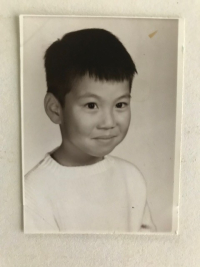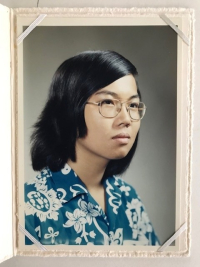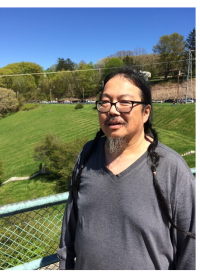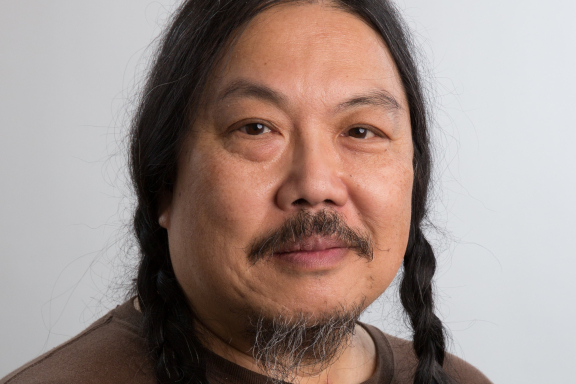Tim Lee was many things: a passionate advocate for mental health, a computer refurbishment technician at Advocates, an active member of Advocates’ Diversity Advisory Council, a valued board member for both Advocates and the Massachusetts chapter of the National Alliance on Mental Illness, a jazz lover, and a multi-lingual puzzle enthusiast.
Tim was also a person who lived with serious mental health challenges. When he passed away in 2021, Tim left behind a powerful first-person account of how Advocates helped him build a life of purpose and community.
As we celebrate Advocates’ fiftieth anniversary, we reflect on Tim’s legacy through his own writing and through the words of those who knew him well.
Tim’s Early Years

Tim’s partner, Naomi, shares the story of Tim’s early years. Tim lived in Boston’s Chinatown neighborhood and then moved to “a very white, affluent suburb of Boston, where he was chastised for speaking Chinese at school. His parents were instructed not to allow him to speak it at home either,” Naomi recalls.
When Tim was at Brandeis University in the early 1980s, he began hearing disturbing voices and talking to himself. Later, according to Tim’s writing, he “was taken to the psychiatric ward in the hospital with scores of police officers present because of my out-of-control, delusional thoughts.” He spent the next decade in and out of psychiatric hospitals.
“Tim did not realize that the harassing chorus of voices he heard every day, sometimes all day, and to which he responded by yelling and flailing his arms about, were not real,” says Naomi.
Tim even spent time in jail. “The police did not know what to do other than to take me into custody. These were the days before the Advocates Jail Diversion Program. If there had been an Advocates mental health worker there, it would have made a difference," Tim wrote.
Living and Learning
As a young adult, Tim was homeless for some time. Later, he lived in cramped, unsafe apartments or boarding houses. One place had a shared bathroom, no kitchen, and just a single window. He had to move several times because he simply couldn’t afford the rent.
Tim witnessed people living in shelters, cars, or on the street. His personal experience led him to reflect often on the importance of affordable housing for people living with mental health and substance-use challenges.

During this time, Tim also rediscovered the library and pursued his love of learning. “Tim told me once that the library became a miracle to him. Every day, Tim took himself down there and studied Spanish. He became friends with someone who spoke Spanish, and Tim became bilingual again. He also began to study computer science, which led to work eventually,” Naomi shares.
Naomi also explains what it meant to Tim to become connected with Advocates in 1995. “It had been a long time since Tim had felt any sense of being wanted. He was not only welcomed, but his life was valued and preserved that day. The staff helped him to apply for SSDI and other public benefits,” she recalls.
Working with Advocates, Tim was able to find a living situation in a group home and eventually lived independently until the end of his life. “Tim became somebody again. He had a roof, food, and a roommate who became his lifelong friend,” says Naomi.
Tim also understood the role that medication can play in managing mental illness, especially because he experienced relapses when he stopped taking his medication. “Advocates staff made sure I took my medication, which was vastly preferable than having to go back to the psychiatric ward. They went out of their way to help me,” he wrote.
Remembering Tim

Tim’s passion for advocating for those with mental illness was unmatched. When he joined the Advocates board, he “openly identified as a person with lived psychiatric experience,” says Keith Scott, vice president of peer support and self-advocacy at Advocates. “He ensured that the voices of the people we serve were heard in vital conversations about philosophy, values, and self-agency. Tim was a quietly impressive person. He spoke very softly, was extremely smart, and was a deeply compassionate person who was always moving toward a solution. It was peaceful to just be around him, in his orbit,” Keith adds.
Christopher Gordon, MD, chief medical officer emeritus for Advocates, says, “Tim became an inspiration to others and a profound contributor to Advocates as we developed more and more person-centered services.”
For her part, Naomi says that she was first drawn to Tim by his “big, beautiful smile. That was his beacon that shined through the darkness of his illness. With one smile, he became your friend, your companion, and someone you wanted to keep in your life indefinitely. When Tim smiled at me, I fell instantly and forever in love with him,” she remembers.
Diane Gould, president and CEO of Advocates, knew Tim for more than thirty years, first as someone who was receiving services, then as an employee, and later when he served on the Advocates board. “Tim was very kind, generous, and patient. He was honest and direct, with a gift for cutting through complex situations and getting to the heart of the matter. He truly embodied his commitment to human rights,” she says.
Tim’s Legacy
A lifelong learner and problem solver, Tim co-founded Project PEACH (Providing Equal Access through Computers at Home). The initiative aims to close the digital divide by refurbishing donated computers and providing them—at no cost—to individuals receiving services from Advocates. “Tim would work tirelessly to refurbish hardware and software, so the people we support could have a computer or laptop to access the internet,” says Keith. Project PEACH continues to this day, with an annual electronics recycling event and fundraiser to provide computers to the people served by Advocates.
Tim left a legacy of strong, quiet advocacy, true compassion, and a deep commitment to making the world a better place. He proved that both giving and receiving support can create a life of purpose and belonging. Diane’s recollection of Tim shines a light on his enduring impact. “Being with Tim was an invitation to slow down and be truly present. In our fast-paced work and world, that was a true gift and something I will always remember and value.”
